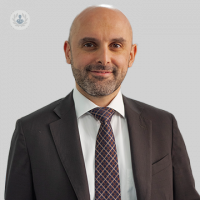Prostate cancer detection and early stage management
Escrito por:Prostate cancer is a significant concern for men, particularly as they age. Early detection is key to successful treatment. Leading consultant urologist Mr Ammar Alanbuki explains all you need to know about detection and diagnosis.

How is prostate cancer detected at its earliest stage?
Prostate cancer is often detected at its earliest stage through routine screening. The two primary methods for early detection are the prostate-specific antigen (PSA) blood test and the digital rectal exam (DRE). The PSA test measures the level of PSA in the blood, with elevated levels possibly indicating the presence of prostate cancer. The DRE involves a physical examination of the prostate through the rectum to detect abnormalities in size, shape, or texture.
Is cure and full recovery guaranteed if it is detected early?
While early detection greatly increases the chances of successful treatment, it does not guarantee a cure or full recovery. Many cases of early-stage prostate cancer can be treated effectively, often leading to long-term remission or even cure. However, outcomes can vary based on factors such as the cancer’s aggressiveness, the patient’s overall health, and how well the cancer responds to treatment.
What tests are carried out to detect prostate cancer at its earliest stage?
The primary tests for detecting prostate cancer at its earliest stage include the PSA test and the DRE. If either test suggests the possibility of cancer, further testing such as a prostate biopsy, MRI, or ultrasound may be recommended to confirm the diagnosis. Newer diagnostic techniques, such as MRI-targeted biopsy, can help pinpoint the exact location of cancer within the prostate, improving the accuracy of detection.
What happens after the diagnosis is made?
After a diagnosis of prostate cancer is made, the next steps typically involve determining the stage and grade of the cancer. This includes assessing how far the cancer has spread (staging) and how aggressive it is (grading). Based on this information, a treatment plan is developed, which may include options like active surveillance, surgery, radiation therapy, hormone therapy, or a combination of these.
The choice of treatment is tailored to the individual’s specific situation, with input from a multidisciplinary team of healthcare providers. Early detection and a clear understanding of treatment options can significantly influence outcomes, making regular screening important for at-risk men.
If you are concerned about prostate cancer and would like to book a consultation with Mr Alanbuki do not hesitate to do so by visiting his Top Doctors profile today


